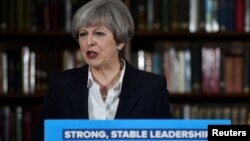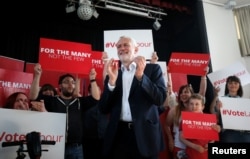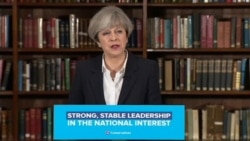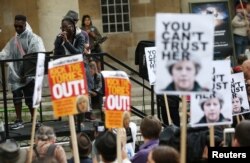Having predicted the last British election wrong, as well as June’s referendum on European Union membership, the country’s pollsters are understandably nervous about Thursday’s vote — even more so after Saturday’s terror attack in the heart of London.
Before the attack, several opinion polls suggested a shift in public sentiment. Prime Minister Theresa May, who called the post-Brexit snap election for June 8, had been tipped to win in a landslide, but the polls have tightened.
A weekend survey conducted before the van-and-knife attack in the London Bridge district of the British capital gave the ruling Conservative a mere one percent lead, down from 20 percent. Another poll last week pointed to the possibility of a hung parliament, although the pollster concerned rushed to offer ‘health warnings.’
The Labour surge, if accurate, would be a remarkable turnaround at the best of times and these are not the best of times for a party led by the most left wing leader in its history, Jeremy Corbyn, who has spent the past 18-months fending off mutinies from his own lawmakers.
Although delighted by an opinion surge in their favor, Labour politicians cast doubt on the polls — as do many pollsters in private, who say they can’t see the public backing Corbyn, a throwback figure to the militant 1970s. At the weekend, another poll had the Conservatives nine percent ahead of their chief rivals.
And in the wake of the weekend attack, which has been claimed by the Islamic State, Labour and the Conservatives are trying to fathom what impact Saturday’s terrorism will have on Thursday’s voting and whether the electoral landscape has been shaken up totally by the murderous rampage that left seven dead and 48 injured.
And no one is sure.
Right-wing edge?
Some academic research suggests Conservatives and right-wing parties, who tend to run on tough law-and-order platforms, benefit politically in the wake of slaughter and mayhem. But that didn't happen in France in April when centrist candidate Emmanuel Macron defeated emphatically his far-right rival Marine Le Pen. And Socialists won in Spain after the 2004 Madrid bombing, defeating ruling conservatives.
On the face of it, the killing spree should boost Theresa May. She has presented herself as a resolute leader throughout the six-week election campaign. In her statement Sunday before the cameras in Downing Street she continued in that style — saying “enough is enough” and that the time had come to be more robust in tackling terrorism.
WATCH: May on importance of election
Labour’s senior leaders have been under attack for weeks from the Conservatives and the country’s tabloid press for their past ‘softness’ on the IRA, Hamas and Hezbollah and for voting against some counter-terror measures.
But last month’s Manchester bombing didn't halt the apparent surge towards Labour. Corbyn’s linking the bombing with British participation in recent wars in the Middle East resonated with voters across the political spectrum.
On Sunday, in a speech in the north of England, he toughened up his rhetoric, praising the police for shooting dead the three London Bridge attackers — in the past he has questioned shoot-to-kill policies — and blasting May for having overseen major and unpopular cuts in police man-power when she was the country’s interior minister.
Voter criticism
If the polls are correct about a shrinking Tory lead, then they have only themselves to blame, according to frustrated Conservative-leaning commentators, who have criticized May and her team for running a sometimes disorganized campaign full of U-turns.
“Even accounting for the eternal tendency of Tories to moan, this latest effort from the Conservative Party ranks as possibly their worst general election campaign since before the war. By which I mean the First World War,” argued columnist Iain Martin in The Times.
The prime minister tried to keep the election focus on Brexit, presenting herself as the strong leader Britain needs to secure a good deal from the EU. But with Labour, the main opposition party, accepting Brexit, voters have appeared more anxious about the state of the country’s National Health Service and social-care system.
Nonetheless, for all of the missteps, and evidence electors don’t warm to her, much of the head-wind the Conservatives have been battling is the same all incumbents across Europe have been confronting since the 2008 financial crash. “The crisis undermined the public’s faith in their rulers,” the Economist magazine argued this week.








